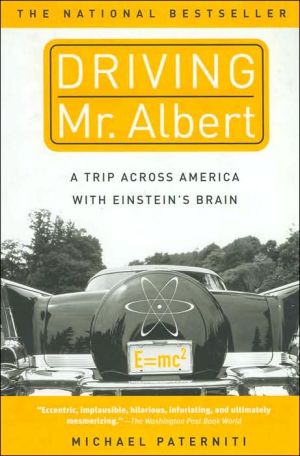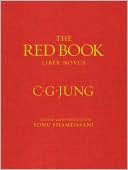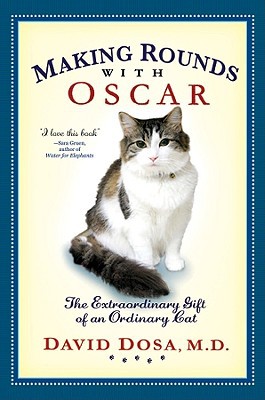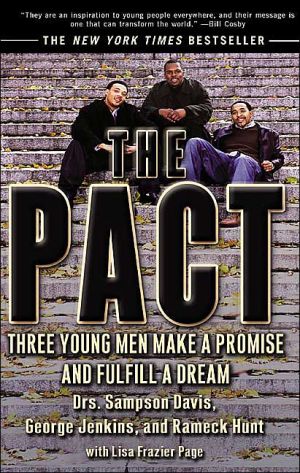Driving Mr. Albert: A Trip across America with Einstein's Brain
Albert Einstein's brain floats in a Tupperware bowl in a gray duffel bag in the trunk of a Buick Skylark barreling across America. Driving the car is journalist Michael Paterniti. Sitting next to him is an eighty-four-year-old pathologist named Thomas Harvey, who performed the autopsy on Einstein in 1955 -- then simply removed the brain and took it home. And kept it for over forty years. \ On a cold February day, the two men and the brain leave New Jersey and light out on I-70 for sunny...
Search in google:
Albert Einstein's brain floats in formaldehyde in a Tupperware bowl in a gray duffel bag in the trunk of a Buick Skylark barreling across America. Driving the car is Michael Paterniti, a young journalist from Maine. Sitting next to him is an 84-year-old pathologist named Thomas Harvey who performed the autopsy on Einstein in 1955 -- and simply removed the brain and took it home. And kept it for over forty years. Paterniti is driving Harvey and the brain from New Jersey to California, where Harvey will show it to Einstein's granddaughter, Evelyn, and also display it to a group of high school students. Driving Mr. Albert is a map of their ten day adventure. With the brain as both cargo and talisman, Paterniti perceives every hotel, truckstop diner, and casino as a weigh station for the American dream in the wake of the scientist's mind-blowing legacy. Billboards, T-shirts, self-appointed Einstein fanatics all become the grist for this dazzling young writer's assessments of Einstein's life and work, as well as the nature of celebrity, relics, and America itself. Finally, inspired by the man who gave a skeptical world a glimpse of its cosmic origins, Paterniti weaves his own unified field theory of time, love, and the power to believe, once again, in eternity. Publishers Weekly Driving a Buick Skylark across the country with an addled octogenarian and an organ may not seem like the ripest material for a story, even if the organ is Albert Einstein's brain. In the hands of a stylish writer like Paterniti, however, the journey becomes a transcendent and hilarious exploration of heady themes like obsession, love and science. In 1955, the octogenarian, a pathologist named Thomas Harvey, removed Einstein's brain during an autopsy and, claiming he wished to study it further, took it home. In the years that followed, he sliced and shipped the brain around the world, but never relinquished most of the organ. Nor, to the criticism of colleagues, did he release his long-promised study. Forty-two years later, Harvey was finally ready to return the brain to Evelyn Einstein, Albert's granddaughter. He enlisted Paterniti, a freelance writer living in Maine, for the task. What ensues is a rare road story that gives equal weight to journey and destination. An expansion of an article published in Harper's magazine, this road-tale bears the classic elements of a spiritual quest--the brain a classic example of a character stand-in. But Paterniti so seamlessly weaves his stream-of-consciousness musings about everything from the theory of relativity to his own sputtering relationship with Harvey that the book becomes much more. Readers will hear echoes from American cultural history--the wanderlust of the Beats, the literary texture of Hemingway and the pastel-tinted surrealism of the Simpsons. It's impossible to put this book down. Paterniti has written a work at once entertaining, psychologically rich and emotionally sophisticated--a feat as rare as, well, Einstein himself. Agent, Sloan Harris. (July) Copyright 2000 Cahners Business Information.\|
On a cold winter day, during one of my early visits to Dr. Harvey, we drove around Princeton, making the obligatory pilgrimage to 112 Mercer Street, the house where Einstein spent the last twenty years of his life. We sat for awhile with the car running, warm air pouring from the heater, gazing at a modest wood-frame colonial with black shutters on a pleasant block of like houses. More than anything, Einstein said he loved the old place for the light that filled the upstairs rooms and for the gardens out back. He kept pictures of Michaelangelo and Schopenhauer hanging in his study, because, as he said, both men had escaped an everyday life of raw monotony and taken "refuge in a world crowded with images of our own creation."\ Sitting in the car, Thomas Harvey recalled hoew the Einstein family gathered here after the scientist's death, how his son, Hans Albert, and Einstein's longtime assistant, Helen Dukas, and Einstein's executor, Otto Nathan, as well as a small group of intimates, drove to a secret spot along the Delaware and scattered the ashes that remained of Albert Einstein's body, And that was it.\ Not surprsingly, however, controversy immediately enshrouded the removal of Einstein's brain. Word was leaked by Harvey's former teacher Dr. Zimmerman that Harvey had Einstein's brain, and that he, Zimmerman, was expecting to receive it from his student. When this was reported in The New York Times a day after Einstein's death, Hans Albert, who knew nothing of his father's brain having been removed, was flabbergasted. Otto Nathan expressed regret and shock, and later implied that Harvey was a bald-faced thief. But, according to Harvey, Nathan, who died in 1984, stood by the door of the morgue, watching the entire autopsy. (Nathan would later claim he didn't know what Harvey was up to.)\ Meanwhile, Harvey announced in a press conference that he was planning to conduct medical research on the brain. He says he spoke to Hans Albert over the phone, assuring him the brain would be studied for its scientific value, which would then be reported in a medical journal, thus allaying one of the deepest fears of the Einstein family: that the brain would becom a pop-cultural gewgaw. "My one regret is that I didn't come to Mercer Street and talk to Hans Albert in person," Harvey told me that day. "You know, clear things up before it got out of hand."\ But things were already out of hand. Zimmerman, then on staff at New York's Montefiore Medical Center, prepared for the delivery of Einstein's brain, but it never arrived. Increasingly flummoxed, then angry and embarrassed, Zimmerman found out that Princeton Hospital, under the direction of a man named John Kauffman, had decided not to relinquish it. "Hospitals Tiff over Brain of Einstein," read one 1955 headline, and went on to describe how the brain remained at "the center of a jurisdictional dispute," with Princeton Hospital standing its ground, like an old-time gunfighter, claiming "the brain wouldn't be taken out of town."\ But then, a few years after the autopsy, Harvey was fired from his job for allegedly refusing to give up Einstein's brain to Kauffman. In fact, Harvey had kept the brain himself, not at the hospital, but at home, and when he left Princeton he simply took it with him. Years passed. There were no studies or findings. And, in turn, no legal action was brought against Harvey, as there was no precedence in the courts for the recovery of a brain under such circumstances. And then Harvey fell off the radar screen. When he gave an occasional interview -- in local newspaper articles from 1956 and 1979 and 1988 -- he always repeated that he was about "a year from finishing study on the specimen."\ Four decades later, there's still no study. And because somewhere in his watery blue eyes, his genial stumble-footing, and that ineffable cloak of hunched integrity that falls over the old, I find myself feeling for him and can't bring myself to ask the essential questions: Is he a grave-robbing thief or a renegade? A sham or a shaman?
\ From Barnes & NobleBarnes & Noble Discover Great New Writers\ What happens when a curious young journalist teams up with the pathologist who dissected Einstein's brain? If a drive cross-country in a Buick Skylark isn't the first thing to come to mind, it's just the first of many humorous surprises in Michael Paterniti's winning account of the transporting of this celebrated cerebellum. \ Encased protectively in a Tupperware container, Einstein's brain is in the possession of Dr. Thomas Harvey. The now 86-year-old former pathologist, who performed the autopsy on Einstein after his death in 1955, raised the story of the missing organ to near mythic proportions when he secretly removed it for his own scientific study.\ Enthralled with the bizarre story of the notorious gray matter, Paterniti sleuths out the location of the elusive pathologist, determined to find out if he is indeed "a grave-robbing thief or a renegade? A sham artist or a shaman?" The friendly but enigmatic Harvey agrees to Paterniti's scheme to chauffeur him from his home in Princeton, New Jersey, to Berkeley, California, where he plans to deliver the brain to Evelyn Einstein, Albert's granddaughter.\ Skillfully weaving facts about Einstein with the quirky narrative of this offbeat road trip, Paterniti's own personal journey rises to the surface as he muses over the course of his own life, including a stalled relationship with a girlfriend in Maine. From cheap motels and diners to kitschy museums and roadside attractions, Michael and his reluctant hero, Dr. Harvey, take readers on an entertaining and touching oddball pilgrimage. Driving Mr. Albert is one trip readers won't soon forget.\ \ \ \ \ \ Publishers Weekly - Publisher's Weekly\ Driving a Buick Skylark across the country with an addled octogenarian and an organ may not seem like the ripest material for a story, even if the organ is Albert Einstein's brain. In the hands of a stylish writer like Paterniti, however, the journey becomes a transcendent and hilarious exploration of heady themes like obsession, love and science. In 1955, the octogenarian, a pathologist named Thomas Harvey, removed Einstein's brain during an autopsy and, claiming he wished to study it further, took it home. In the years that followed, he sliced and shipped the brain around the world, but never relinquished most of the organ. Nor, to the criticism of colleagues, did he release his long-promised study. Forty-two years later, Harvey was finally ready to return the brain to Evelyn Einstein, Albert's granddaughter. He enlisted Paterniti, a freelance writer living in Maine, for the task. What ensues is a rare road story that gives equal weight to journey and destination. An expansion of an article published in Harper's magazine, this road-tale bears the classic elements of a spiritual quest--the brain a classic example of a character stand-in. But Paterniti so seamlessly weaves his stream-of-consciousness musings about everything from the theory of relativity to his own sputtering relationship with Harvey that the book becomes much more. Readers will hear echoes from American cultural history--the wanderlust of the Beats, the literary texture of Hemingway and the pastel-tinted surrealism of the Simpsons. It's impossible to put this book down. Paterniti has written a work at once entertaining, psychologically rich and emotionally sophisticated--a feat as rare as, well, Einstein himself. Agent, Sloan Harris. (July) Copyright 2000 Cahners Business Information.\|\ \ \ Adam GoodheartSuch a trip might sound at first like an amusing stunt . . . but not exactly promising material for an entire book. . . . Somehow, though, [Paterniti] spun his tale out into a narrative that, perhaps like the wild-haired physicist himself, is simultaneously dead serious and inescapably funny.\ —The New York Times Book Review\ \ \ \ \ Claudia KalbA splendid peek into the weird side of American life where, often as not, things simply do not add up, Driving Mr. Albert is a work of—OK, maybe not genius, but certainly uncommon intelligence. \ —Newsweek\ \ \ \ \ Marlene AdelsteinPaterniti's lovely prose and sense of humor make it well worth the trip. \ —Time Out New York\ \ \ \ \ Talk MagazinePart memoir, part travelogue, and part meditation, Paterniti's tale is, as he puts it, stranger than "the devil crapping on a big pile."\ \ \ \ \ Vanessa V. FriedmanWhether brains or scraps of a rock star's clothing, Paterniti illuminates them, with exceptional skill, as the magical repositories of our dreams and yearnings. \ —Entertainment Weekly\ \








